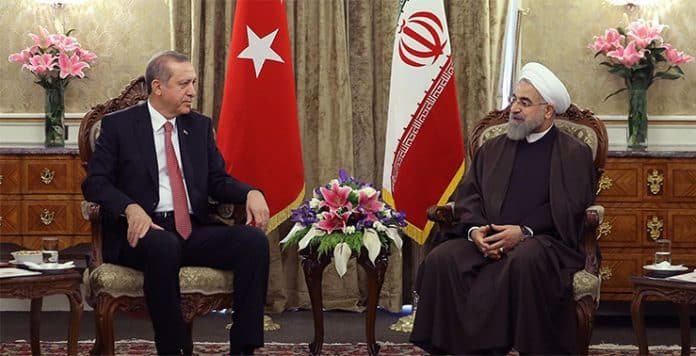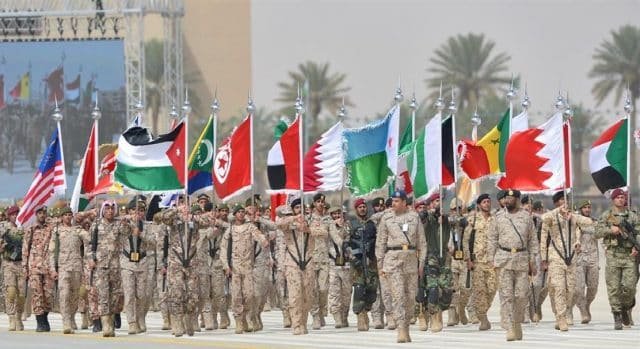
NEO – On the Expanding Turkey-Iran Cooperation in Syria
by , … with New Eastern Outlook, Moscow
[ Editor’s Note: VT readers know how much time we have spent watching Turkey with its roller-coaster policy of supporting Syria, then looting it, especially the Aleppo area, followed by supplying both militants and Jihadis via its border.
This kept the war going on longer and with more civilian suffering. We also watched Turkey fund the terrorists by buying their looted oil – all done as US F-16 pilots watched the long convoy columns running constantly with no interdiction allowed by US command. Pilots who were unhappy with this kept us informed.
Turkey was in a delicate situation with Iran, as it had helped Tehran circumvent some of the economic sanctions by allowing their own cross-border trade and more than a little gold bullion movement, which helped Iran get through its most difficult time.
It was during those dark days when Ali Salami asked VT if we could help get their side of the story out, after PressTV was banned from the EU satellite channels. We agreed, not solely to assist Iran, but so our own readers could evaluate Iran’s geopolitical position themselves.

We found an unknown commentary section link buried inside their website that we suggested would be the perfect platform to try to gain an international audience, but they would have to promote in more prominently, both on the front page and via PressTV interviews. The rest is history. We helped them build a huge international audience.
Rafi Sheikh gives us an excellent review of the evolution of the complex relationship between Turkey and Iran, more so now, as the US has included Turkey on the open sanctions warfare target list after the failed coup that Erdogan claims the US was behind – what some might call the prelude to interfering in an election.
No one stands alone against the US-Israeli hegemony in the Middle East anymore. US-NATO aggression has forced those targeted to form their own defensive coalitions. There will be no more easy targets for the US . . . Jim W. Dean ]
 Jim's Editor’s Notes are solely crowdfunded via PayPal
Jim's Editor’s Notes are solely crowdfunded via PayPal
Jim's work includes research, field trips, Heritage TV Legacy archiving & more. Thanks for helping. Click to donate >>

– First published … October 07, 2018 –
Despite numerous western mainstream media predictions about possible conflict of interest between Iran, Turkey and Russia in Syria, this conflict hasn’t happened. On the contrary, prospects and possibilities of cooperation continue to increase as the war in Syria nears its end.
Its latest illustration can be found in the case of Idlib where Iran did not object or confront Turkey’s concerns, but accommodated these concerns, reflecting how prudent Iran is in terms of keeping the alliance alive, an alliance that, over the past two years, has served interests of all of the participant countries.
One primary reason for the continuation of this cooperation is the way their interests continue to converge, not just in Idlib, but also in other hot areas of Syria, such as the northeast, where the US forces and the US backed Kurdish militias are active and are yet to handover the region to Syria. But the US, as John Bolton revealed a few days, intends to stay in Syria as long as Iran stays.
While this probably means that the US aims to continue to fight its war with Iran in Syria, it also opens another possibility of cooperation between Turkey and Iran in northeast Syria.
While Turkey’s source of discomfort is the continued US support for Kurdish militias, which Turkey considers terrorists, Iran, too, sees these groups as US proxies, likely to be used to disrupt and damage the gains they have made in Syria.
Iranian leaders have recently voiced how important it is to rid areas to the east of Euphrates of the US influence. This makes Iran a natural ally of Turkey, which, too, has been seeking to achieve this goal, which is also the underlying source of persisting tension in the US-Turkey relations.
With Turkey and Iran focusing on the SDF held territory; therefore, the prospects of jointly confronting the US have certainly increased. Ironically enough, it is the US itself that continues to give both Iran and Turkey all the reasons to converge.
For instance, when John Bolton says that the US will not leave Syria as long as Iran does the same first, it means that the US will continue to patronize Kurds, Turkey’s primary enemies, which further implies that Turkey cannot think of counting on the US support for militarily eliminating Kurds and pushing them away.
On the contrary, that Turkey will be taking action in northeast Syria was clearly expressed by Erdogan soon after he clinched a deal on Idlib.
To quote him, “Turkey will take action east of the Euphrates River in Syria and impose secure zones as it has done in the northwest of the country.” And, as the most recent developments indicate, Turkey’s parliament has endorsed the mandate for Turkish military’s action against Kurds in Syria.
For Iran, there cannot be a better scenario for cooperation with Turley than there is now. What the renewal of this mandate means (Turkey has been renewing this mandate ever since 2014) is that Turkey is continuing with its policy of not normalizing its relations with the US and that it intends to remain attached to Sochi process of Syria’s reintegration as a sovereign state.
The importance of Sochi framework cannot be denied since Turkey itself used the same platform to get its Idlib policy approved by Russia, Syria and Iran, plus including Hezbollah.
There are, of course, some gray areas as well. A lot of things depend upon how well Turkey manages Idlib. Turkey’s failure to fulfill its part of the deal would only make a Russian-Iranian offensive inevitable, which, if happens, will put Turkey in a difficult position vis-à-vis both Iran and Russia and Astana and Sochi peace processes.
The question is: in the wake of a full scale offensive in Syria, and in the wake of Turkey being again burdened with refugees, will it continue to cooperate?
On the other hand, the fact that the US sanctions and tariffs have caused Turkish lira to fall 40 per cent against US dollar means that prospects of Turkey-US relations getting on a positive trajectory are very grim, which means that Turkey will find it extremely difficult to alienate itself completely by ending its cooperation with Iran and Russia in Syria.
Besides this, the mood in Turkey remains overtly anti-US. When he opened Turkish parliament’s session this week, Erdogan not only lambasted the US’ Syria policy and its reliance on weaponising Kurds, but also attacked the “warped mindset that uses a priest being prosecuted for his dark ties to terrorist organisations as a pretext to impose sanctions”.
While Turkey is unlikely to change its course in Syria, prospects of its cooperation with Iran in northeast Syria remain brighter than those of confrontation and conflict. And unless there occurs a major policy reversal in Washington towards Turkey, which is extremely unlikely to happen under the Trump presidency, this cooperation will continue a lot more smoothly than meets the eye.
Salman Rafi Sheikh, research-analyst of International Relations and Pakistan’s foreign and domestic affairs, exclusively for the online magazine “New Eastern Outlook”.

Jim W. Dean is VT Editor Emeritus. He was an active editor on VT from 2010-2022. He was involved in operations, development, and writing, plus an active schedule of TV and radio interviews. He now writes and posts periodically for VT.
ATTENTION READERS
We See The World From All Sides and Want YOU To Be Fully InformedIn fact, intentional disinformation is a disgraceful scourge in media today. So to assuage any possible errant incorrect information posted herein, we strongly encourage you to seek corroboration from other non-VT sources before forming an educated opinion.
About VT - Policies & Disclosures - Comment Policy




Not that the Kurds are very likable; but just where on this planet are they supposed to go? Maybe we can send them to Arizona and Utah to deal with the Salinas drug mafia.
Terrorists? That word is thrown around alot.
Where are the Kurds supposed to go? Is it possible that without US/Israel guidance, to stir the kettle, the Kurdish populations would have assimilated wherever they lived, be it Iraq, Turkey, Syria or Iran?
Comments are closed.